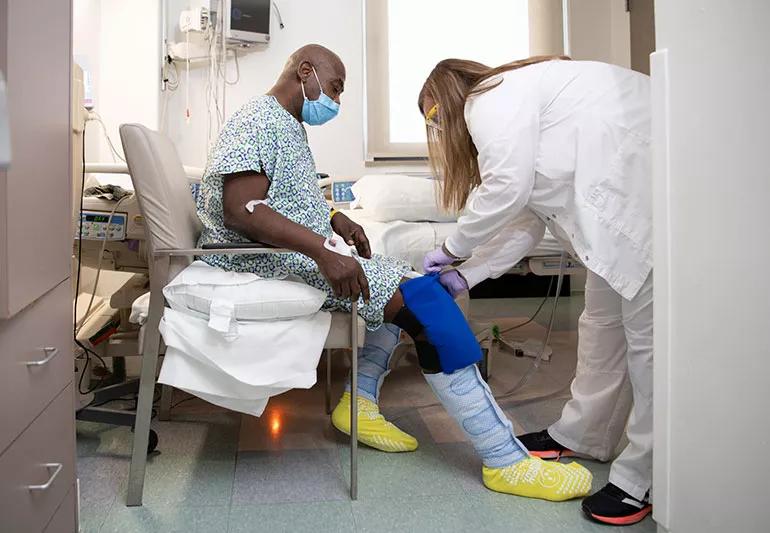Plus, tips on how to recover

Image content: This image is available to view online.
View image online (https://assets.clevelandclinic.org/transform/0337a928-5a78-4fab-a48b-089e9a717005/KneeReplacement-2054018-DG-770x533-1_jpg)
A healthcare provider checks on a patient's knee while they sit on a chair in their hospital room.
Today, people are enjoying longer lives — but joint pain from osteoarthritis persists and can interfere with an active lifestyle. That’s why many people decide to have hip or knee replacement surgery.
Advertisement
Cleveland Clinic is a non-profit academic medical center. Advertising on our site helps support our mission. We do not endorse non-Cleveland Clinic products or services. Policy
But is it possible to ever be too old for joint replacement? Orthopedic surgeon Nicolas Piuzzi, MD, discusses whether there’s an age cutoff for this surgery and what you should consider before having it.
When someone talks about getting a hip or knee replacement, they’re probably referring to total joint replacement surgery.
Surgeons perform total joint replacements on many joints, but hips and knees are the most common. During total joint replacement, an orthopedic surgeon removes the damaged cartilage. Then, they replace the damaged sections of the joint with specialized metal, plastic or ceramic parts.
This surgery relieves symptoms of osteoarthritis (OA), which is the most common type of arthritis. OA happens when the cartilage inside a joint breaks down. Cartilage is the smooth material that cushions your joints. When it wears down over time, it causes pain, swelling and stiffness.
The new joint allows you to move without the pain and stiffness of OA.
“More people are reaching their 80s and 90s, and many of them lead active lives,” says Dr. Piuzzi. “So we’re seeing more people in these age groups who want relief from hip or knee pain.”
Total joint replacement is major surgery and requires several weeks of recovery at home. But despite this, you’re never “too old” to have your hip or knee replaced.
Advertisement
“There is no age cutoff for joint replacement,” says Dr. Piuzzi. “Studies have found that people in their 80s and 90s benefit from hip or knee replacement as much as younger people.”
Here’s what you can expect to do after your surgery.
“There is no one-size-fits-all approach to hip or knee replacement,” says Dr. Piuzzi. “The surgical team will personalize the surgery for you. And you need to weigh the benefits and risks of having the surgery.”
Before undergoing hip or knee replacement surgery, you and your healthcare provider should discuss the following.
Having a chronic condition doesn’t exclude you from hip or knee replacement. But your medical team should consider any conditions before you move forward. For instance, if you have:
If you take prescription or over-the-counter medications or supplements, your surgeon needs to know. You may need to stop taking them several days before surgery.
Recovery from total joint replacement takes work. You have to complete specific exercises and follow a physical therapy plan. But you don’t need to be in peak physical condition to get a new hip or knee. Your doctor will just want to ensure you have enough strength to successfully recover from surgery.
Having people who can help you during recovery is a key part of the joint replacement process. Make sure you have a friend or loved one who can stay with you during the early days of recovery. And you’ll need to have someone to run your errands or take you to therapy before you can drive again.
Not everyone who has OA needs joint replacement surgery. Your orthopedic surgeon may recommend these options before deciding on surgery:
Advertisement
Every surgery has risks. The question you must ask — and discuss with your healthcare provider — is whether the benefits outweigh the risks.
“Older adults often have many years ahead of them,” says Dr. Piuzzi. “How do you want to live those years? Don’t be afraid to ask your doctor about joint replacement, no matter your age. When you have all the facts, you can make an informed decision.”
Advertisement

Sign up for our Health Essentials emails for expert guidance on nutrition, fitness, sleep, skin care and more.
Learn more about our editorial process.
Advertisement
An expert explains the potential benefits
Even one less pound helps preserve hips and knees
Simple exercises to build balance and strength
Managing this common condition
The short answer from a rheumatologist
Some creakiness is typical after rest, but longer-lasting stiffness may be other issues
As long as it’s done correctly, knuckle cracking is safe
What’s the difference between these types of inflammatory arthritis?
Type 2 diabetes isn’t inevitable with these dietary changes
Applying a hot or cold compress can help with pain
Pump up your iron intake with foods like tuna, tofu and turkey